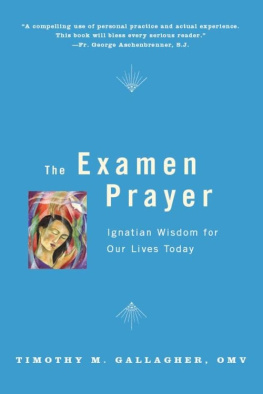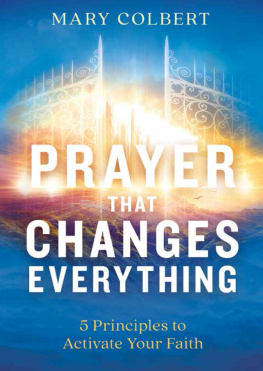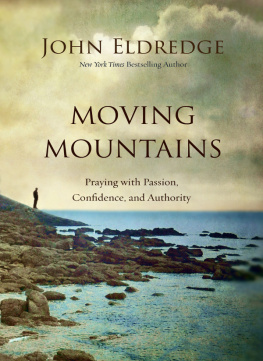One of the reasons the writings of St. Ignatius continue to serve us well five centuries later is that he himself understood that his instructions would need to be adapted for the various situations wherein they would be employed. He was fond of giving a firm directive but then telling the reader that it should be adjusted in view of the circumstances of places, times and persons. He believed so strongly in this adaptation that at times he makes us laugh. As novice director, I read together with the novices St. Ignatiuss rule for the Jesuits, the Constitutions of the Society of Jesus. Again and again, this headstrong Basque tells his Jesuits that such and such must be carried out exactly in this particular way, but then adds, unless it seems prudent to do otherwise. This always do it this way... unless you discern otherwise makes us chuckle from time to time. An example of this from his Spiritual Exercises is in his Fourth Annotation wherein Ignatius explains that the full retreat is divided into four weeks. Then he says, It is not to be understood that each week has, of necessity, seven or eight days. For, as it happens that in the first week some are slower to find what they seek... it is necessary sometimes to shorten the week, and at other times lengthen it. Well enough, but then Ignatius tries but fails to lay down a stricter rule: However, the Exercises will be finished in thirty days... a little more or less.
As humorous as it may sound at times, it is this very characteristic of St. Ignatius that has made his work as fruitful today as in the sixteenth century. Ignatius had the foresight to know that the interior life must be adapted to fit the circumstances of the exterior life. To be sure, the God we encounter in different places and in different ages is the same yesterday, today and forever, but how we experience that same God is affected by the exterior circumstances of life. The Ignatian teachings of spiritual desolation and consolation hold as true for a sixteenth-century Basque priest as they do for a twenty-first-century American wife and mother. But the two will experience these truths differently because of the dramatic contrast in their exterior lives. Ignatian spirituality endures through the ages precisely because Ignatius got just right the balance between the unshakeable foundations of our faith and the supple fluidity of its lived expression.
This is why this book is so groundbreaking and important: In her own life, Becky Eldredge has discovered ways of living out the lasting truths of St. Ignatius as she meets the challenges, opportunities, joys, and struggles of a contemporary American wife and mom. For too long, the written explications of Ignatian spirituality have been the exclusive work of Jesuit priests. Finally, we return to Ignatiuss great insight about adaptability and allow a fresh new voice from a fresh new perspective to break through.
And what a freshness! A great gift of Ignatian spirituality is the Application of the Senses, the use of our imagination to prayerfully envision ourselves as characters in the biblical stories. Ignatian writers have taught this for centuries. But only now, the Ignatian world gets to read how a mom prayerfully experiences Mary holding the baby Jesus in her arms. Only now do we reflect on the young love of our relationship with God through the life experience of a young American couple, laboriously and yet endearingly negotiating the way this new family will wash its Cajun cast-iron skillet.
Perhaps what I as a Jesuit priest and spiritual writer appreciate most is the overarching thesis of Eldredges work, strikingly articulated near the end of the book:
People question me all the time because of my age at pursuing a life of prayer during the season of life I am in. They imply that my relationship with God should somehow be delayed to a later season, when my kids are no longer in my house or when my professional career is further along. I cannot count the number of times people have, to my face, questioned the ministry work I do, causing immense doubt in me. Every time, though, I bring this doubt to God in prayer, and God affirms my call to both be in relationship with God and to do the work I do.
So this is why I am here, now, writing this book. Because I hope that you hear a different message from me than I heard at times. The time for prayer is now. I do not care what is going on in your lifeif you are raising kids or are an empty nester. I dont care if you are working eighteen hours a day seven days a week or are faced with hours of loneliness a day. It doesnt matter if you are young or old, single or married, religious or ordained. The time for prayer is now.
It was not that hard for me to rise before sunrise this morning, grab a cup of strong Louisiana coffee, and begin my Ignatian meditation in my quiet little bedroom in a house full of priests, brothers, and seminarians. I have no experience, however, of being awoken by pajama-wearing, sweet, squealing little kids jumping in my bed. As an administrator, I have lots of experience poring over profit-and-loss sheets, but I dont know what its likein the midst of changing diapers and straightening toy roomsto worry about how my family will make ends meet in a new city and in a depressed economy. Because I have no such experience, I perhaps lend too much credence to the naysayers who claim, Sure, a regular, sustained prayer life is possible for a celibate priest, but not for a struggling young mom. It is not for me to dispute such a claim. It takes a young, Ignatian wife, mom, and professional woman to stand strong and tell the world that such a person exists.
And not only exists, but thrives.
Mark E. Thibodeaux, SJ
One Friday night in March 2011, I stepped outside a chapel in Athens, Georgia, into the cool evening air during a period of silent prayer at a weekend retreat. It was a retreat for those in their twenties and thirties, based on the spirituality of St. Ignatius.
As the doors of the chapel closed behind me, I caught a glimpse of thirty of my peers sitting in total silence and prayer in the chapel. The silence followed me as I took a few deep breaths outside. There, I noticed the world alive around me. Across our churchs parking lot, a young woman, along with her family and friends, celebrated her quinceaera in our main building. The pounding music and laughter of the people drifted across the church parking lot as the doors to the main building opened and closed. I breathed in the joy of the moment.
In the distance, I heard the crack of a baseball bat and the cheering of fans at the University of Georgia baseball game. I smiled at the cheers, knowing something good had just happened in the game. I breathed in the excitement of our community.
Then I looked up because of the sound of approaching helicopters. They were flying low and moving quickly, their lights scanning the area. I knew they were looking for a young man who had shot and killed a police officer in our community days earlier. I breathed in the sadness of their search.
All at once, I found myself overcome with the understanding that God was in all of these moments at the same time: God speaking to each man and woman in silent prayer in the chapel; God celebrating with those at the party; God savoring the communitys enjoyment of the baseball game; and God in the search for that young man, comforting the family and friends of the fallen police officer, comforting the family of the man on the run, and offering wisdom in the decisions made by the man and by the officers who sought him.














